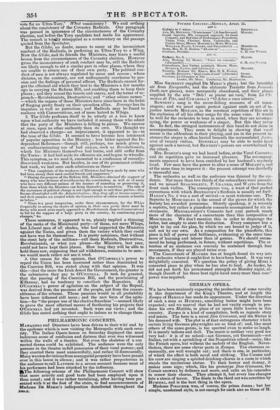PHILHARMONIC CONCERTS.
MANAGERS and Directors have been driven to their wits' end by the epidemic which is now visiting the Metropolis with such seve- rity. The Italian Opera-house on Saturday displayed the most ludicrous scene of confusion and distress that ever was witnessed within the walls of a theatre. Not even the skeleton of a con neeted drama could be exhibited. The audience were the only persons in the theatre in full possession of their vocal powers; and they exerted them most unmercifully, and rather ill-humouredly. Many wanton deviations from managerial propriety have been passed over in this house in silence; and it was rather preposterous in the audience to call LAPORTE to a severe account because most of his performers had been attacked by the influenza.
Mahe following scheme of the Philharmonic Concert will show that more activity and good taste had been employed upon it than usual; and it was rather ta.ntalizing, after having been pre sented with it at the foot of the stairs, to find announcements of Madame DE MEatc's indisposition distributed throughout the reos.a.
ACT II.
Sinfonia, No. 5.
HAYDN.
Aria, Madame DE M ERIC, " Tutto tin concento" (Euryanthe) C. M. voIVEnEn. Concertaute, four Violins principal, Messrs. Hoar, SEYMOUR, PATSY, and GRIMACE{ MAURER. Terzetto, Madame DE. MER1C, Mrs. H. R. BISHOP, and Mr. BENNETT, "Quid canna al suol"(Jessontkt) Sponn. Overture, /a C lemon= di Tito MOZART. Leader, Mr. MORI, Conductor, Mr. Meseta:1.Es.
Miss SHIRREFF supplied DE MERIC's place; but the beautiful air from Euryanthe, and the elaborate Terzetto from Jessondu (both new pieces), were necessarily abandoned, and their places supplied by the aria "Deli! se piacer mi vuoi," from La Cle menza di Tito, and CIMAROSA'S "0 slolce e care istante."
BENNETT'S song is the never-failing resource of all tenor- singers; and we must again protest against such an act of in- justice towards MOZART, as the constant repetition of this air to the exclusion of all his other songs for the same voice. It would be well for the orchestra to bear in mind, when they are accompa- nying, the power or weakness of a singer. But this they never do. In fact, the stringed instruments of this band do not shine in accompaniment. They seem to delight in showing that vocal music is the addendum to their playing, and (as in the present in- stance) the singer is often buried beneath the accumulated fortis- rind of twenty violins. DONZELLI may be able to make head against such a torrent, but BENNETT'S powers are overwhelmed by the attack.
Mrs. BISHOP'S song we had heard before, at the Vocal Concerts; and its repetition gave us increased pleasure. The accompani- ments appeared to have been enriched by her husband's masterly hand. Few men have the power to alter a score of MOZART'S, and at the same time to improve it : the present attempt was decidedly a successful one.
The orchestra as well as the audience was thinned by the epi- demic. Not more than two thirds of the subscribers were present; and we missed SPAGNOLETTI, F. CRAMER, and WATTS from the front rank violins. The consequence was, a want of that perfect correctness with which BEETHOVEN'S Sinfonia is usually set forth. HAYDN'S No. 2 was a sort of revival—a most welcome one. The Septette by MOSCHELES is the second of the pieces for which the Society has awarded premiums. Strictly speaking, it is scarcely a septette, but rather a pianoforte concerto accompanied by six in- struments. MENDELSSOHN'S Concerto last year partook much more of the character of a concertante than this composition of MOSCHELEs. We don't mention this in order to disparage the latter, but simply to state the distinction. Every composer has a right to lay out his plan by which we are bound to judge of it, and not by our own. is a composition for the pianoforte, this piece is full of power and brilliancy, evidencing at the same time more of learning and labour than of genius. We should recom- mend its being performed, in future, without repetitions. The at tention of an audience can scarcely be sustained through four movements, if they are played twice over.
The Concertante of MAURER has at length found its way into the orchestra where it ought first to have been heard. It was very delightfully executed. We question the policy of giving Motu a concerted piece to play when he has also to lead. As leader, he did not put forth his accustomed strength on Monday night, al- though (bereft of his three best right-hand men) more than usur'i power was required.
ACT I.
Sinfoula in C minor
Aria, Mr. BENNETT. "Ii ado tesoro" ("I Doe Giovanni) Grand Septette, MS. composed expressly for these Concerts, and first time of Performance, Pianoforte, Violin, Viola, Clarinet, Horn, Violoncello, and Contra Basso, Messrs. MOSCHELES, MORI, MORAL% WILLMAN. PLATT. LINDLEY, and DRAGONETTI .. • Scene, Mrs. II. R. BISHOP, " Ah non so". Overture, Preciosa
FOURTH CORcEna—MONDAY, APRIL 15.
BE MOZART.
Moscurtrs.
MOZART.
C. H. YON WEBER.


















 Previous page
Previous page